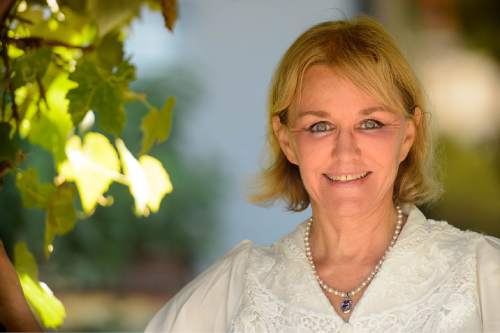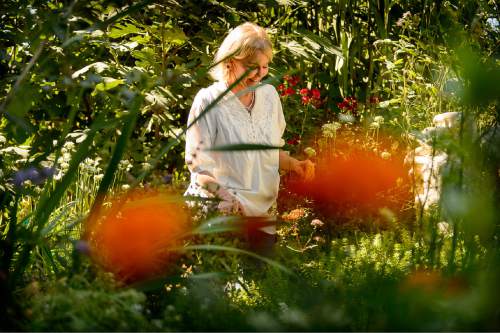This is an archived article that was published on sltrib.com in 2015, and information in the article may be outdated. It is provided only for personal research purposes and may not be reprinted.
Ty Markham fears time is running out for humans to reverse an abusive relationship with the planet, and she is drawing on her LDS faith to rally fellow Mormons to do something about it.
"The best thing I could do is inspire activism among my LDS brothers and sisters to not be afraid, to stand up in their communities. We have been admonished to do that for years from the pulpit, to be active in all realms," said the former University of Utah psychologist who now resides in Torrey.
Two years ago, she co-founded the Mormon Environmental Stewardship Alliance to confront the warming climate, polluted air, disappearing water and other challenges arising from decades of wanton use of natural resources. The group — whose acronym, MESA, happily matches one of Utah's signature topographical features — boasts about 1,300 members in 15 nations.
Markham, a convert to the faith, moved to Utah from Ohio to attend LDS Church-owned Brigham Young University in Provo.
She has worked as a psychologist with the U. and more recently took over a historic schoolhouse in Torrey, where she operates a bed-and-breakfast in scenic redrock country and serves on the Town Council.
Along with architect Soren Simonsen, BYU anthropology professor Charles Nuckolls and other academics, Markham spun off MESA from LDS Earth Stewardship, whose nonprofit status prohibited the political action that MESA's founders wanted to pursue.
In Utah, the group is working against the tide, but Markham hopes for a change in the state's political dynamic, thanks to strong signals coming from The Church of Jesus Christ of Latter-day Saints.
"It takes quite a bit to get it moving, but once it's moving, it can't be stopped. We see signs that [LDS] leaders at the top are aware that climate change is a serious issue. They understand the science," she said. "The church is turning its attention to our planetary home. We have lived in a bubble, but now people are waking up. MESA has been a little part of that."
More than five years ago, top-level LDS leaders began trumpeting the faith's new "green" meetinghouses. They showcased five prototypes, including a Farmington stake center, complete with solar panels, drought-tolerant landscaping and designated parking for electric cars. Drip irrigation and smart controllers using reclaimed water reduce pressure on limited water.
"There is something very doctrinally sound when we talk about conservation of resources," said the church's then-Presiding Bishop H. David Burton, who urged fellow Mormons to consider their own environmental stewardship.
"This is a teaching moment," Burton said. "This aspect of our culture has become a vital part of our DNA."
The Utah-based faith also devotes a page on its website to environmental stewardship and conservation.
"To truly reverence the Creator, we must appreciate his creations," the page states. "God intends his creations to be pleasing to look upon and to enliven the mind and spirit. For that reason, making the Earth ugly offends him. It is important to see and appreciate the glory and grandeur of God in everything about us, because the state of the human soul and the environment are interconnected — each affects the other.
"... God has made us accountable for the care and preservation of the Earth and the wise use of its resources," the page continues. "As stewards, we avoid complacency and excessive consumption, using only what is necessary. We make our homes, neighborhoods and cities beautiful. We preserve resources and protect for future generations the spiritual and temporal blessings of nature."
Practicing what it preached, the church launched a recycling program at its Salt Lake City headquarters that netted 245 tons of paper and cardboard and 26 tons of plastic in 2013.
The LDS Church's current point man on environmental ethics appears to be Marcus Nash, a former Seattle attorney who serves in the faith's First Quorum of the Seventy. The general authority has spoken of the value God places on all forms of life and that how we treat them is a test of our morality.
"Our approach to the environment must be prudent, realistic, balanced and consistent with the needs of the Earth and of current and future generations," Nash said as a featured speaker at the University of Utah's 2013 Stegner Symposium. "In an effort to go to the root of the issue (no pun intended), I suggest that it cannot be reasonably disputed that we depend upon this Earth to sustain life, and that the quality of the Earth and its environment will directly affect the quality of our life — and that of future generations."
In his address, titled "Righteous Dominion and Compassion for the Earth," Nash contended that these postulates have been largely disregarded because of their cost and inconvenience.
"If we understand who we are, the purpose of our existence, and the reason the Earth was created — and keep these things in mind — our conduct would rise to a higher, nobler level. And that is where religion and faith play a major role," he said. "As stewards over the Earth and all life thereon, we are to gratefully make use of that which the Lord has provided, avoid wasting life and resources, and use the bounty of the Earth to care for the poor."
Markham and her associates point to the words of early Mormon leaders, found in sacred texts such as the Doctrine and Covenants and the Pearl of Great Price, to argue environmental protection is a foundational LDS tenet.
So if Mormon scriptures are replete with calls to treat the Earth and its creatures gently, why are political leaders in predominantly Mormon Utah so enamored of ramping up extraction of the state's dirtiest resources, such as coal and tar sands, damming rivers and eradicating predators?
"If you decide you want something, you can find something in the Scriptures that supports it," Markham said. "At least 90 percent of LDS people feel we need to look at Earth stewardship instead of Earth usership. Stewardship is making sure the garden is dressed and sustainable."
Many rural Utahns and the county commissioners who represent them embrace the idea of "stewardship," but they draw much different conclusions than MESA backers.
Some rural leaders argue that federal bureaucrats and activists are abusing environmental regulations to smother livestock grazing, logging, minerals extraction and motorized access. Many of them, including Escalante's Greg Allen and Blanding's Phil Lyman, have served as Mormon bishops. This frustration helps drive Utah's bid to take over 30 million acres of public land. State leaders say Utah agencies are better suited than the Bureau of Land Management and other federal outlets to administer the land and its trove of natural resources. Both the environment and rural communities, they argue, will be better off once the feds relinquish control of the land.
"We are not buying it, because we have seen [the state's] track record," Markham said. "In Utah, the reality is giving the good old boys opportunities to make more money. They want to capture the money that can come off those lands."
A vocal leader in the land-transfer movement is Kanab lawmaker Mike Noel, a rancher and former BLM realty official who has staked his Republican political career on rural resentment stoked from the 1996 designation of the Grand Staircase-Escalante National Monument.
At the time Markham co-founded MESA, she was fresh off a failed campaign to claim Noel's House seat. She may have lost the 2012 election, but she views the 30 percent of the vote she corralled as a victory, given Noel's influence in his southern Utah district.
She believes Noel's real constituents are livestock and extractive industries, not rural residents, and his mindset is locked in a past when few rules governed logging, damming and drilling.
"This was before we understood these resources are finite and are polluting and they are warming the planet. Many of our fellow species will not survive," Markham said. "Our mission is to care for all our brothers and sisters on the planet, not just our human brothers and sisters. It's the entire web of life that is divine. We are taught that over and over in our scriptures."
bmaffly@sltrib.com What the Scriptures say
Doctrine and Covenants 136:27
"Thou shalt be diligent in preserving what thou hast, that thou mayest be a wise steward; for it is the free gift of the Lord thy God, and thou art his steward."
Doctrine and Covenants 59:18-20
"Yea, all things which come of the Earth, in the season thereof, are made for the benefit and the use of man, both to please the eye and to gladden the heart;
Yea, for food and for raiment, for taste and for smell, to strengthen the body and to enliven the soul.
And it pleaseth God that he hath given all these things unto man; for unto this end were they made to be used, with judgment, not to excess, neither by extortion."
Doctrine and Covenants, 104:13-15
"For it is expedient that I, the Lord, should make every man accountable, as a steward over earthly blessings, which I have made and prepared for my creatures.
I, the Lord, stretched out the heavens, and built the Earth, my very handiwork; and all things therein are mine.
And it is my purpose to provide for my saints, for all things are mine."





